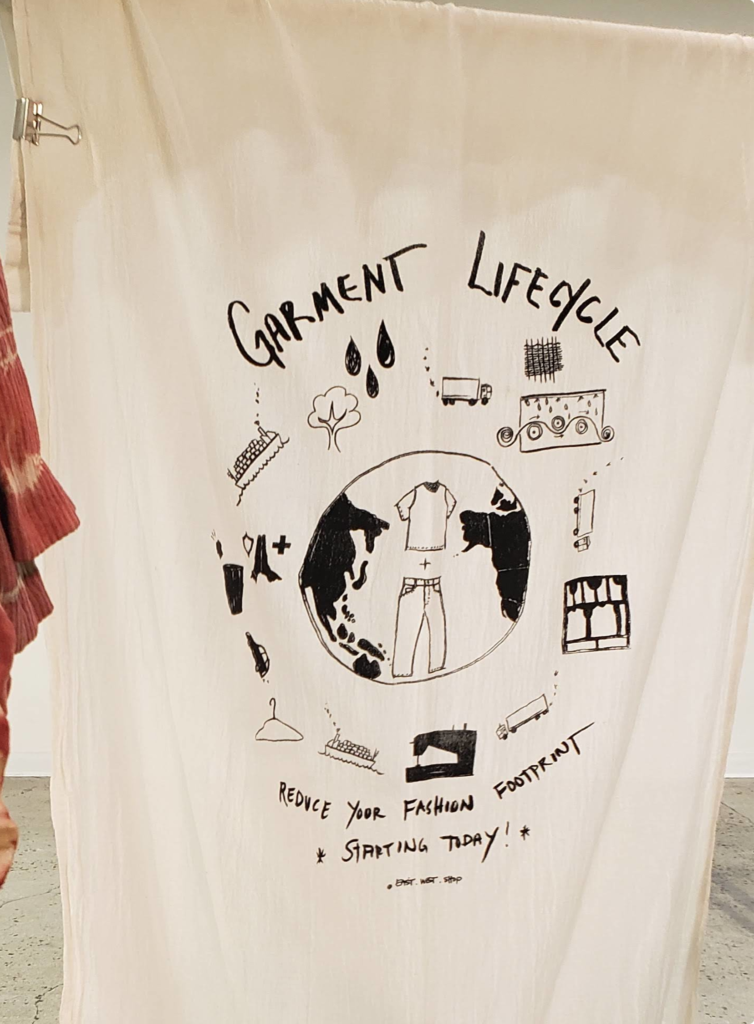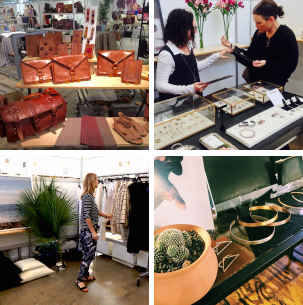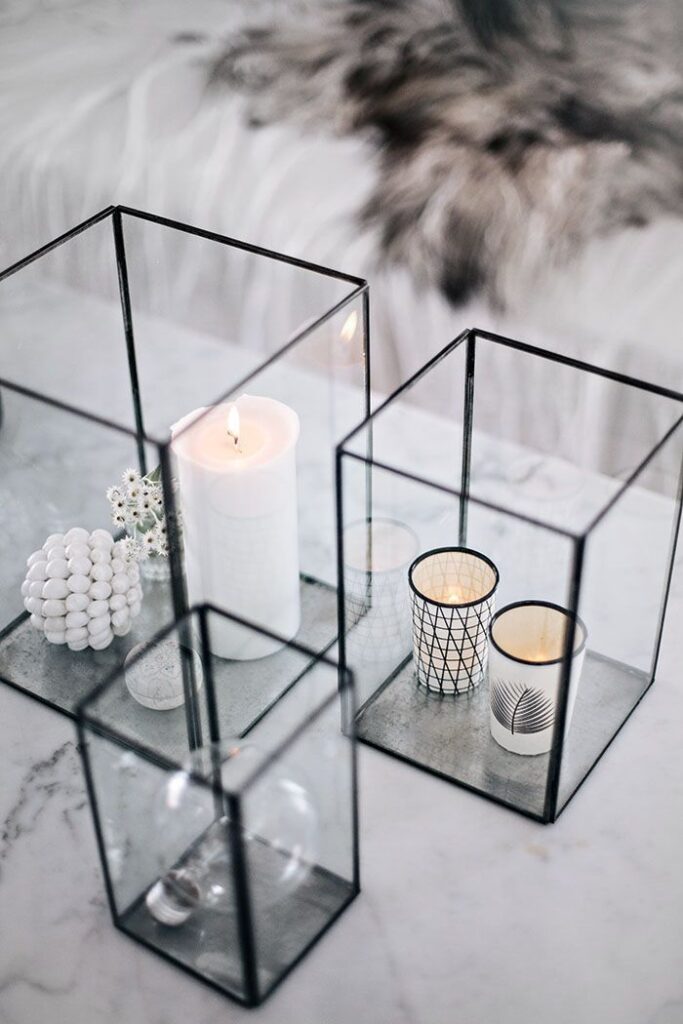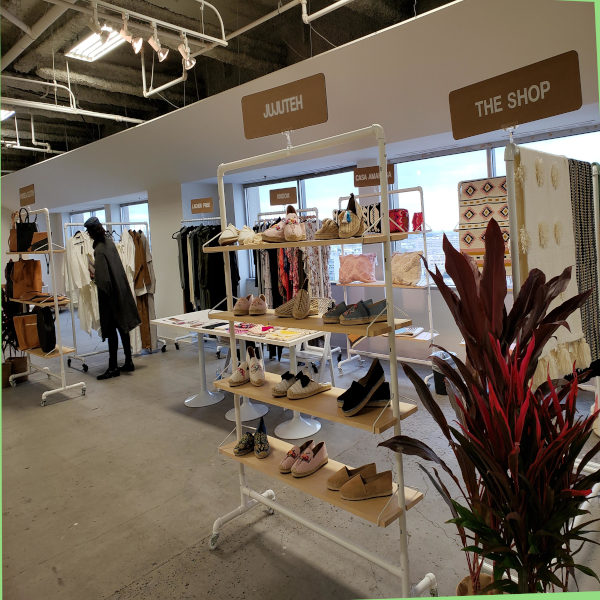It’s our huge appreciation for luxurious fabrics, beautiful garments, and inspiring designs that got us into the fashion industry!
And it’s our decades of experience in the fashion industry and our understanding of all the facets of design, production, wholesale, retail, and marketing that helped us see the need for change and the ability to do something about it.

Even with all the daily news articles about the urgency of climate change and global warming, many consumers still don’t really see the connection (or are in denial) between the cheap prices they pay for clothing and the hidden environmental and social costs of these choices. Many people are still unaware (or in denial) that fashion is responsible for 20% of global pollution, and how all of these add up: raw materials production, manufacturing of fabrics and components, packaging, transportation (of fabrics, multiple sets of samples, finished goods, e-commerce shipments and returns), and disposal when no longer needed.
It’s working in production and wholesale that we got to see first-hand the fabric waste involved, the labor cost and over-production pressure…And our work in wholesale allowed us to see all the inherent challenges and disfunctions still existing within the fashion industry at various levels.
Thoughts about fabric waste and sustainability percolated to the background for many years, as we rushed between back-to-back trade shows and production schedules, managed brands’ retailer relationships through production deliveries, ordering minimums, and off-shore manufacturing, and tried to keep up with the insane pace and price competition of the industry.
As we started working with sustainable brands over the last few years at wholesale, the challenges of building sales in a system structured for price competition, economies of scale, and constant growth became increasingly evident.
After many cancelled flights caused by erratic weather patterns, and hearing from increasing numbers of boutiques affected by fires and flooding in the last few years, climate change began to hit home, and became harder to ignore.
It all came together in the summer of 2019, as we watched the signing of the Paris Pact by major fashion brands and the massive fires burning in the Amazon. The ethical and sustainable brands we worked with were getting lost in the mix of price-driven fast-fashion brands at trade shows and competing for attention from buyers looking to maximize profits. It increasingly became clear that the increasingly price-driven markets were simply not a level playing field for purpose-driven sustainable brands. They needed to be in a dedicated space where everyone shared the same values.


As former designers and production managers, we knew how much fabric got wasted in sampling and production, and how hard it was to build a successful brand and do things right when labor and materials costs squeezed profits to near-zero. We knew that the burden of sustainability and doing things differently first fell upon the brands, as most retailers did not start considering sustainable brands until after 2015.
As retail buyers and boutique owners, we were familiar with the challenges that independent retailers face, as well as the rewards of creating great experiences for our clients, and creating happy, returning customers. As one of the first boutiques to actively support sustainable fashion brands in the early 2000’s when stylish and sustainable didn’t sit together, we knew the pivotal role that boutiques play in the market as taste-makers…and now they can also be change-makers.
From our work in wholesale as we connected hundreds of brands and retailers, we saw the importance of buyers in the whole fashion eco-system: how they curate selections for their clientele, shape trends, introduce brands into the market, support local talent, and contribute to a vibrant shopping and street scene in their local community.
Even with the growth of online retail, we know that buyers and retailers still exert influence through the products they offer. There are still some buyers focused on stocking price-conscious, trendy fast-fashion goods that bring short-term profits, and are reluctant to take the risk. But long-term, retailers will need to evolve their offering to keep up with the evolution in customer demand.
Sustainable goods and ethical production may be less affordable for some consumers and stores may need to adjust their offerings and value proposition. Conscious consumption (confirmed as a rising trend with Gen Y and Gen Z) is not just a fashion, it’s a lifestyle: it incorporates the home, health, beauty, and objects that surround us. Conscious consumption is more focused on the whole experience rather than just the transaction.
In a world where e-commerce brings convenience, retailers need to bring the experience, a unique experience that reflects their curatorial eye and creative vision.

We’re passionate about brands & retailers.
Besides saving retail buyers time in searching for these brands (of which, many are not household names yet), we also wants to find other ways to help retailers, particularly independent retailers, they are so near and dear to us!
We want to see them thrive and continue to play an important part in our communities and we want them to continue adding the in-person dimension to the local experience that consumers still crave for!
We’re passionate about fashion and beautiful objects, and just as passionate about leaving a better world for future generations. It’s time for everyone to take action and do what we can to build a more sustainable lifestyle –this is why we started O2 Show. We’re beyond grateful for this opportunity to unite our expertise in creating O2 Show and look forward to evolving together. Thank you for joining us in this effort!
